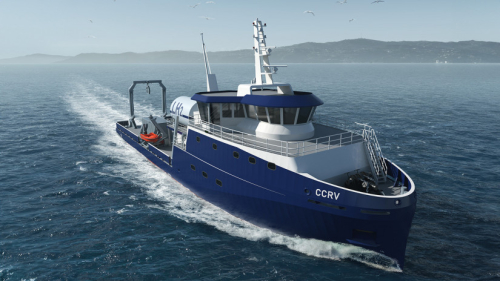The vessel’s design was developed by naval architecture and marine engineering firm Glosten. Approval of the preliminary design shows that it meets technical requirements and safety standards, and lays the groundwork for the expanded use of zero-emission hydrogen-powered propulsion at sea.
The ship will feature a hydrogen fuel cell propulsion system that will allow it to operate with no greenhouse gas or other emissions for 75% of its missions—and for all of its time operating in state waters. For longer missions farther offshore, extra power will be provided by clean-running modern diesel generators.
The ship, now known as the California Coastal Research Vessel (CCRV), will be dedicated to California research missions to observe and measure biological, chemical, geological and physical processes including research to better understand fisheries, harmful algal blooms, severe El Niño storms, atmospheric rivers, sea-level rise, ocean acidification, and oxygen depletion zones.

The new 125-foot vessel will replace Research Vessel Robert Gordon Sproul, which has served thousands of University of California students in its 43 years of service but is nearing completion of its service life. The California Coastal Research Vessel will be equipped with the latest instruments and sensing systems, including acoustic Doppler current profilers, seafloor mapping systems, midwater fishery imaging systems, biological and geological sampling systems, and support for airborne drone operations.
As the first liquid hydrogen-powered ship in the United States, the California Coastal Research Vessel required the development of an entirely new regulatory framework, setting precedents for the technical standards governing the construction and operation of hydrogen-powered ships.
During the vessel’s preliminary design, Glosten worked closely with the American Bureau of Shipping as well as the US Coast Guard to inform regulations and ensure the new liquid hydrogen-powered research vessel complied with them.
In 2018, Glosten, Sandia National Laboratories, and DNV completed a feasibility study funded by the US Department of Transportation Maritime Administration that became the genesis of CCRV. The study evaluated the technical, regulatory, and economic feasibility of the Zero-V concept, a vessel powered by fuel cells and liquid hydrogen designed to meet performance and environmental criteria established by Scripps.
The study confirmed that a hydrogen-powered research vessel was possible, and in 2022 the Office of Naval Research supported the preliminary design effort under Award N00014-22-1-2765 (any opinions, findings, and conclusions or recommendations here are those of the authors and do not necessarily reflect the views of the Office of Naval Research).
The team at Glosten is currently progressing the California Coastal Research Vessel to the next phase of its design process and will assist Scripps as it begins its search for a contractor to complete the vessel’s construction.